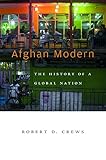Afghan modern : the history of a global nation / Robert D. Crews.
Material type: TextPublication details: Cambridge, Massachusetts : The Belknap Press of Harvard University Press, (c)2015.Description: 1 online resource (381 pages) : illustrations, mapContent type:
TextPublication details: Cambridge, Massachusetts : The Belknap Press of Harvard University Press, (c)2015.Description: 1 online resource (381 pages) : illustrations, mapContent type: - text
- computer
- online resource
- 9780674495746
- 9780674495760
- History of a global nation
- DS356 .A344 2015
- COPYRIGHT NOT covered - Click this link to request copyright permission: https://lib.ciu.edu/copyright-request-form
| Item type | Current library | Collection | Call number | URL | Status | Date due | Barcode | |
|---|---|---|---|---|---|---|---|---|
 Online Book (LOGIN USING YOUR MY CIU LOGIN AND PASSWORD)
Online Book (LOGIN USING YOUR MY CIU LOGIN AND PASSWORD)
|
G. Allen Fleece Library ONLINE | Non-fiction | DS356 (Browse shelf(Opens below)) | Link to resource | Available | ocn927140862 |
Includes bibliographies and index.
Imperial cosmopolitans -- Forging an Afghan empire -- Bodies in motion -- The star of Asia -- Seduced by capital -- The atomic age -- Revolutionary dreams -- At the center of humanity.
Rugged, remote, riven by tribal rivalries and religious violence, Afghanistan seems to many a forsaken country frozen in time. Robert Crews presents a bold challenge to this misperception. During their long history, Afghans have engaged and connected with a wider world, occupying a pivotal position in the Cold War and the decades that followed. Rugged, remote, riven by tribal rivalries and religious violence, Afghanistan seems to many a country frozen in time and forsaken by the world. Afghan Modern presents a bold challenge to these misperceptions, revealing how Afghans, over the course of their history, have engaged and connected with a wider world and come to share in our modern globalized age. Always a mobile people, Afghan travelers, traders, pilgrims, scholars, and artists have ventured abroad for centuries, their cosmopolitan sensibilities providing a compass for navigating a constantly changing world. Robert Crews traces the roots of Afghan globalism to the early modern period, when, as the subjects of sprawling empires, the residents of Kabul, Kandahar, and other urban centers forged linkages with far-flung imperial centers throughout the Middle East and Asia. Focusing on the emergence of an Afghan state out of this imperial milieu, he shows how Afghan nation-making was part of a series of global processes, refuting the usual portrayal of Afghans as pawns in the "Great Game" of European powers and of Afghanistan as a "hermit kingdom." In the twentieth century, the pace of Afghan interaction with the rest of the world dramatically increased, and many Afghan men and women came to see themselves at the center of ideological struggles that spanned the globe. Through revolution, war, and foreign occupations, Afghanistan became even more enmeshed in the global circulation of modern politics, occupying a pivotal position in the Cold War and the tumultuous decades that followed.
COPYRIGHT NOT covered - Click this link to request copyright permission:
There are no comments on this title.
